Unit 4 I used to be afraid of the dark 知识点讲解课件(共63张PPT)
文档属性
| 名称 | Unit 4 I used to be afraid of the dark 知识点讲解课件(共63张PPT) |
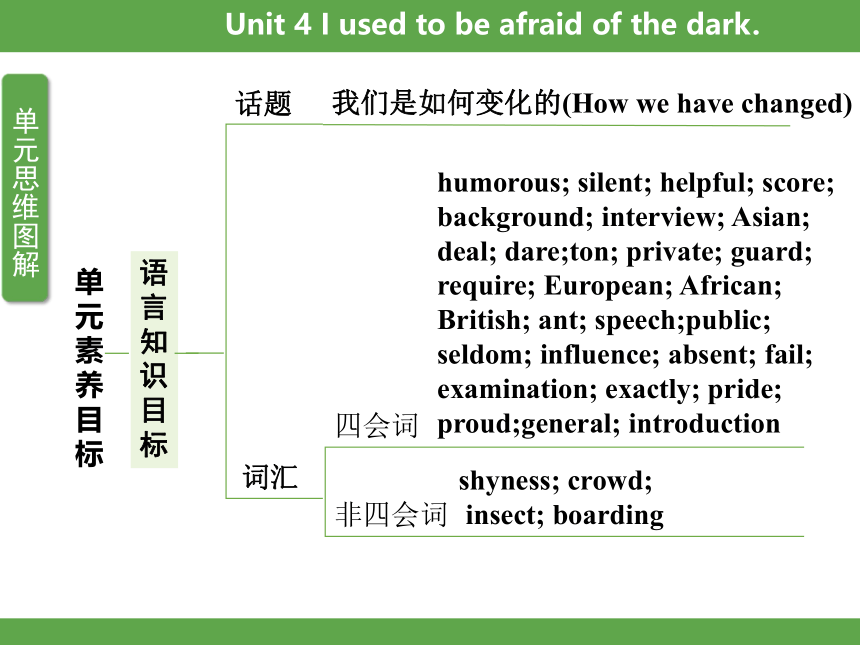
|
|
| 格式 | pptx | ||
| 文件大小 | 472.1KB | ||
| 资源类型 | 教案 | ||
| 版本资源 | 人教新目标(Go for it)版 | ||
| 科目 | 英语 | ||
| 更新时间 | 2024-07-03 00:00:00 | ||
图片预览

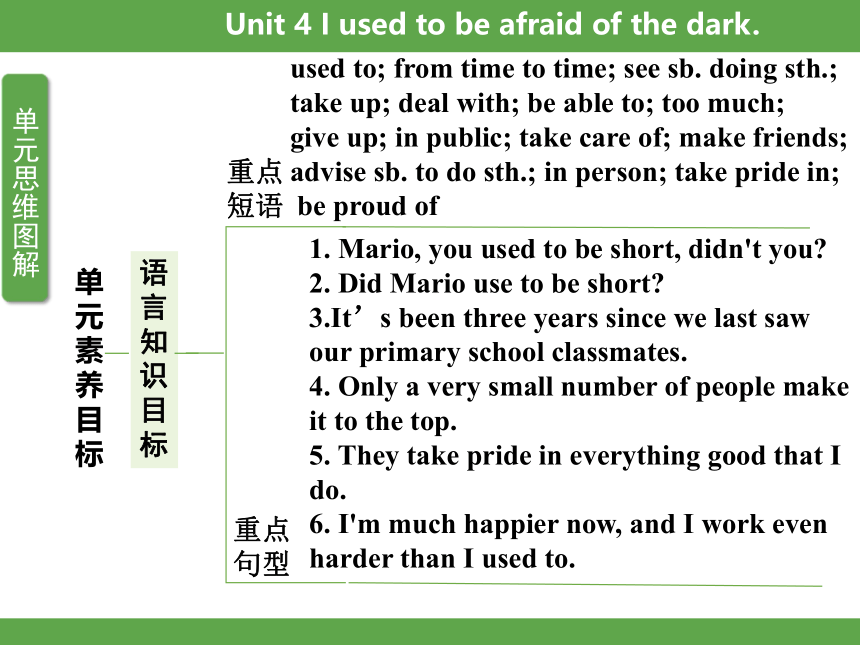
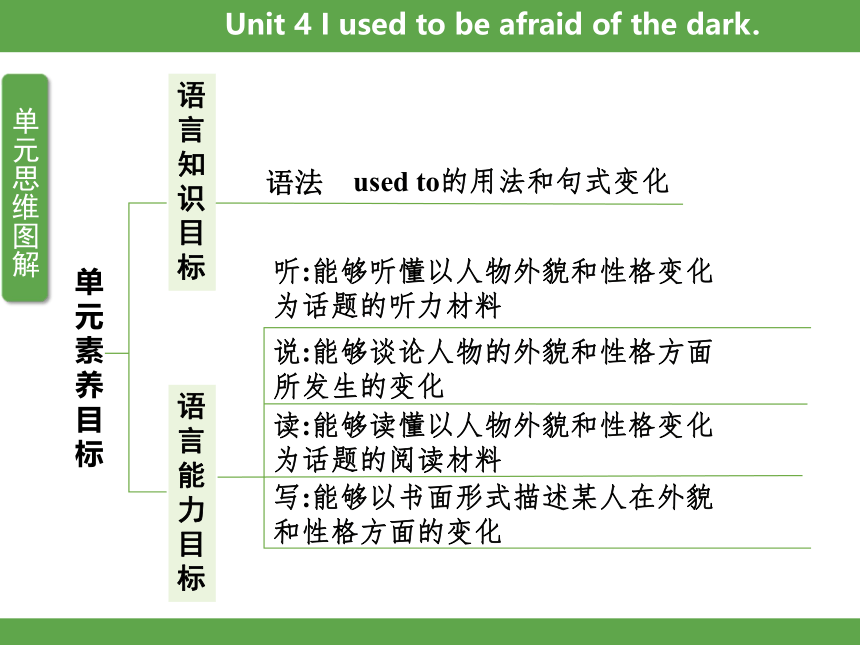
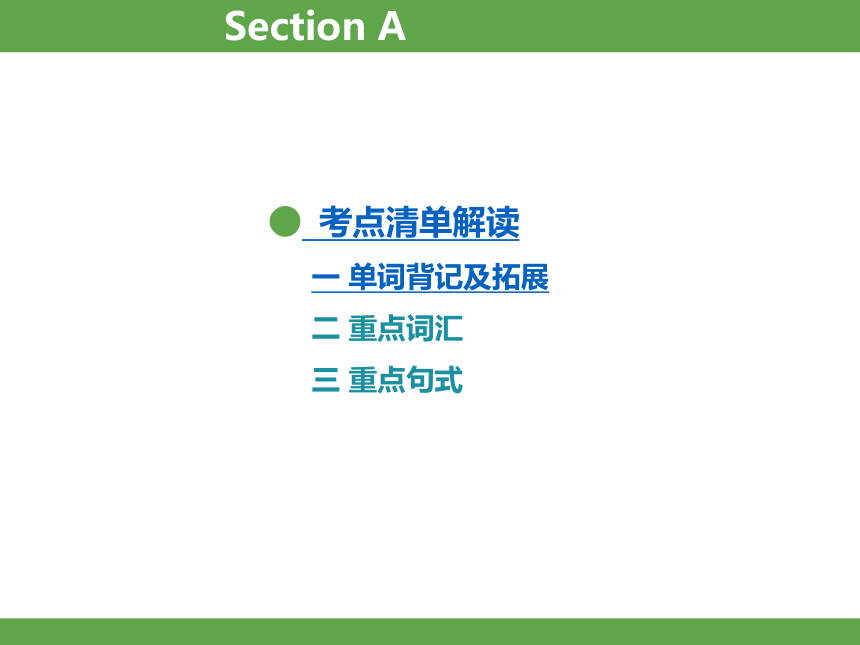
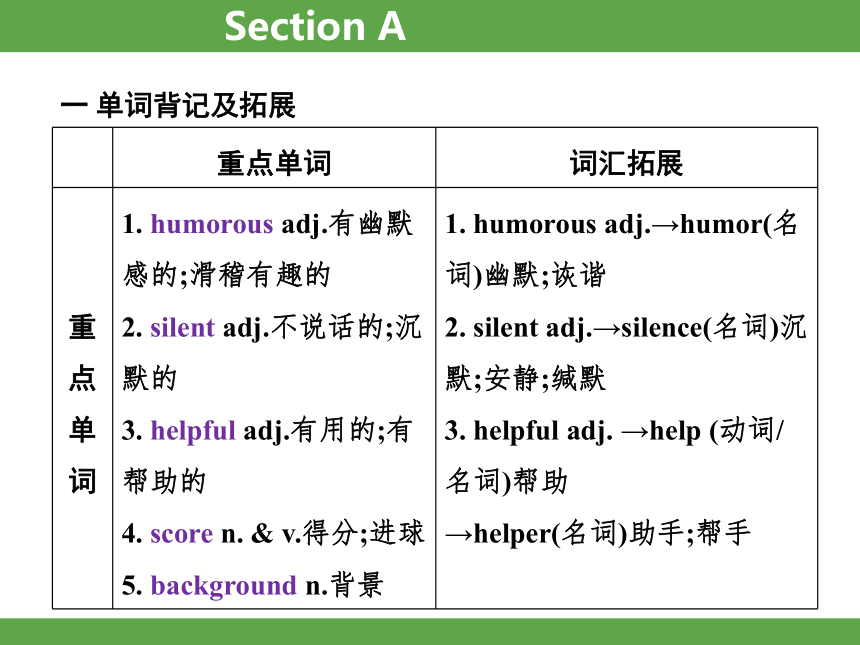
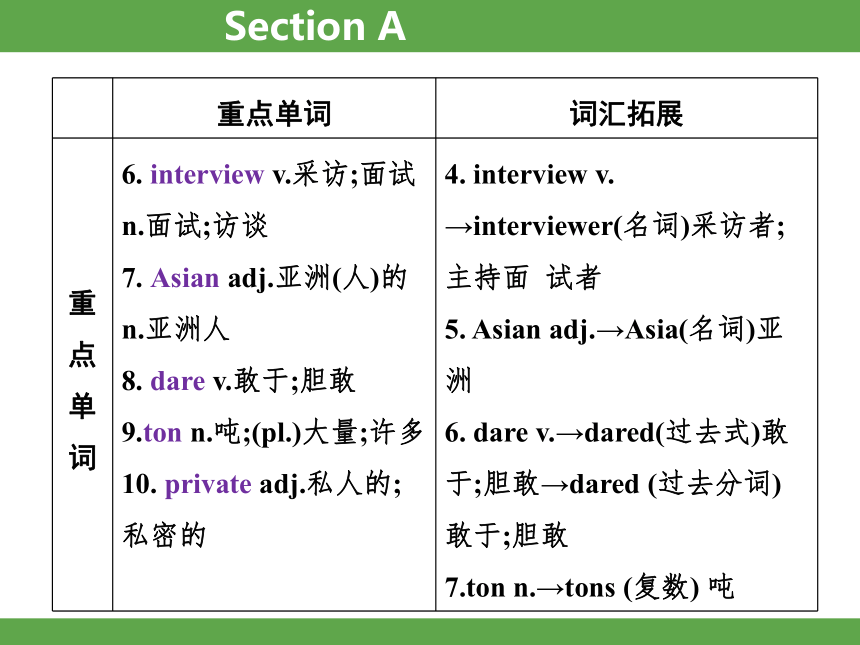
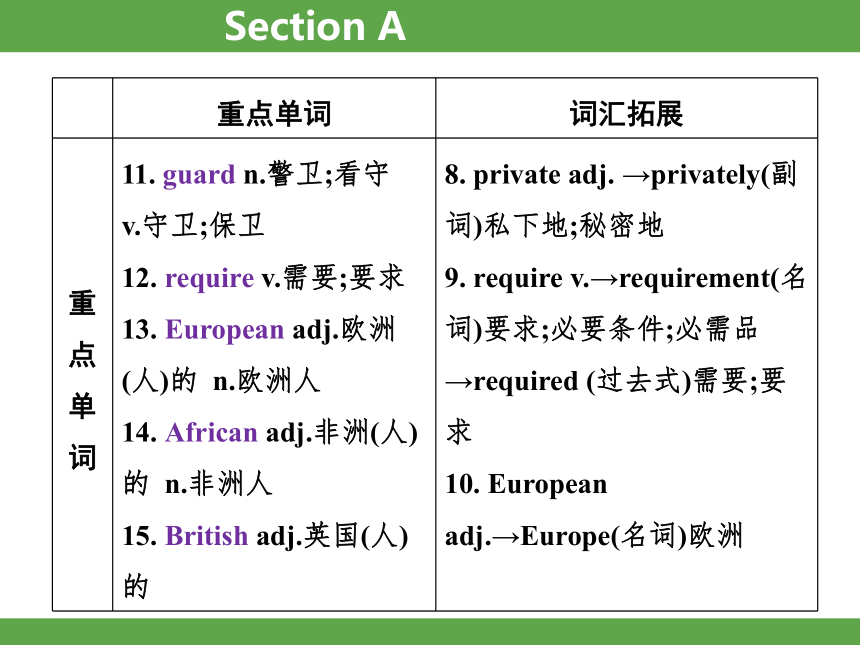
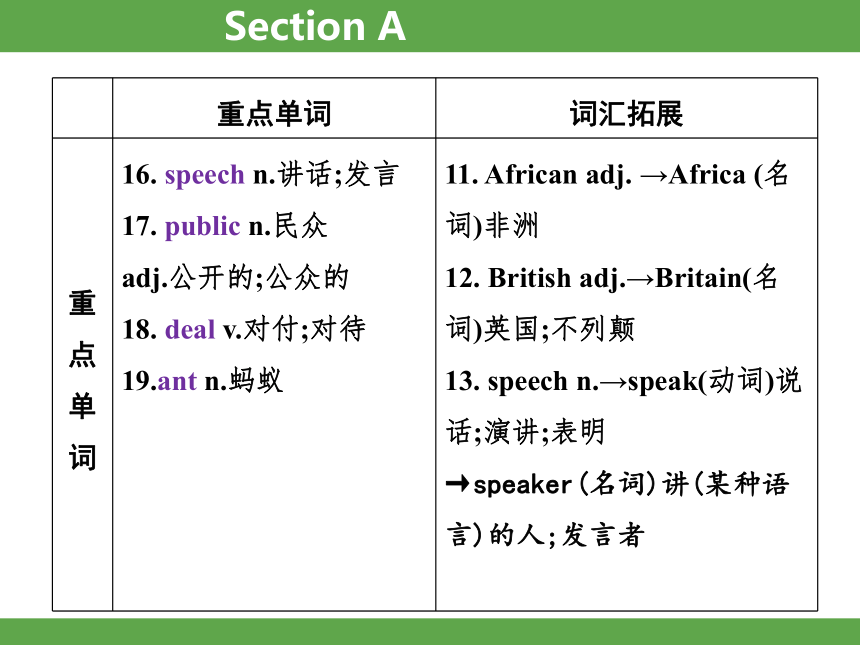
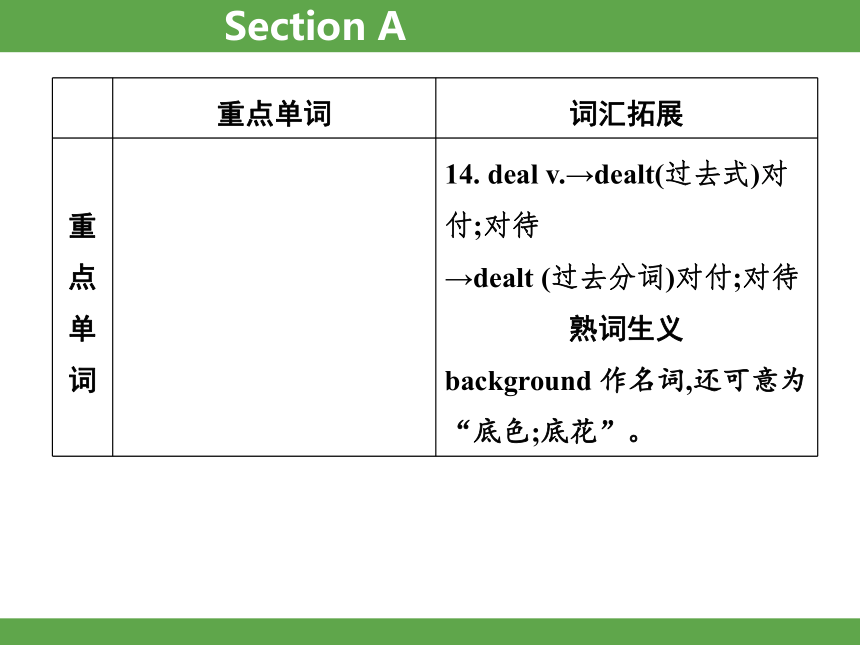
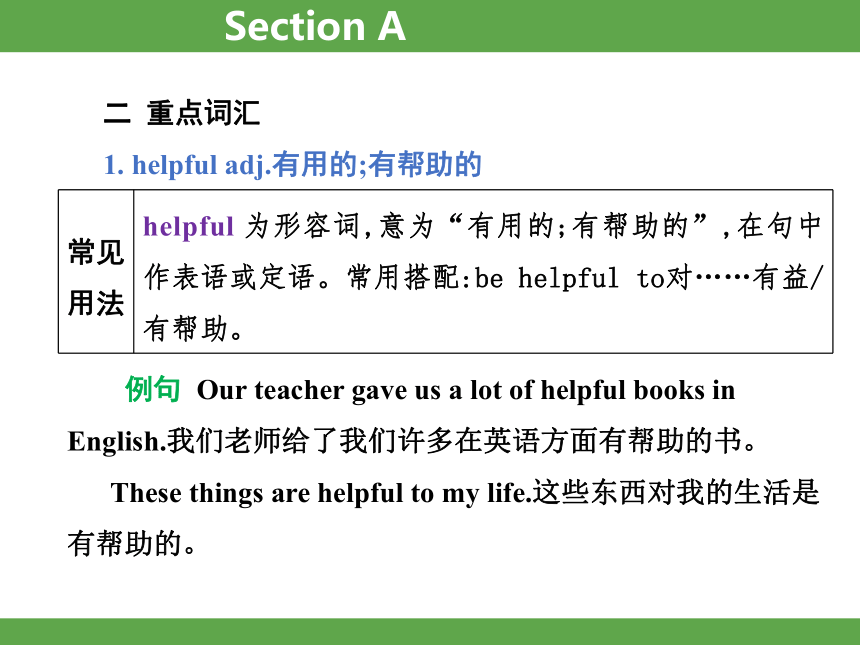
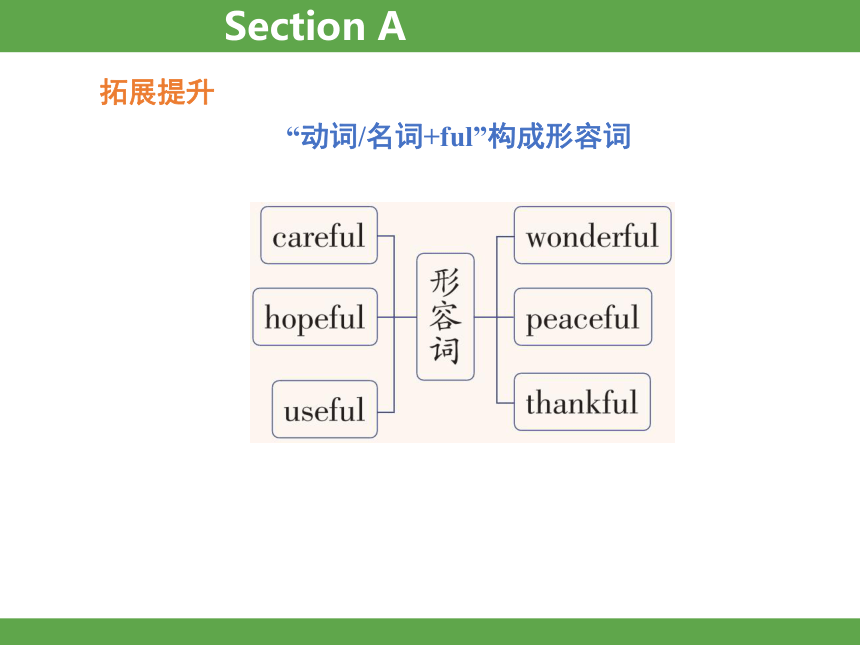
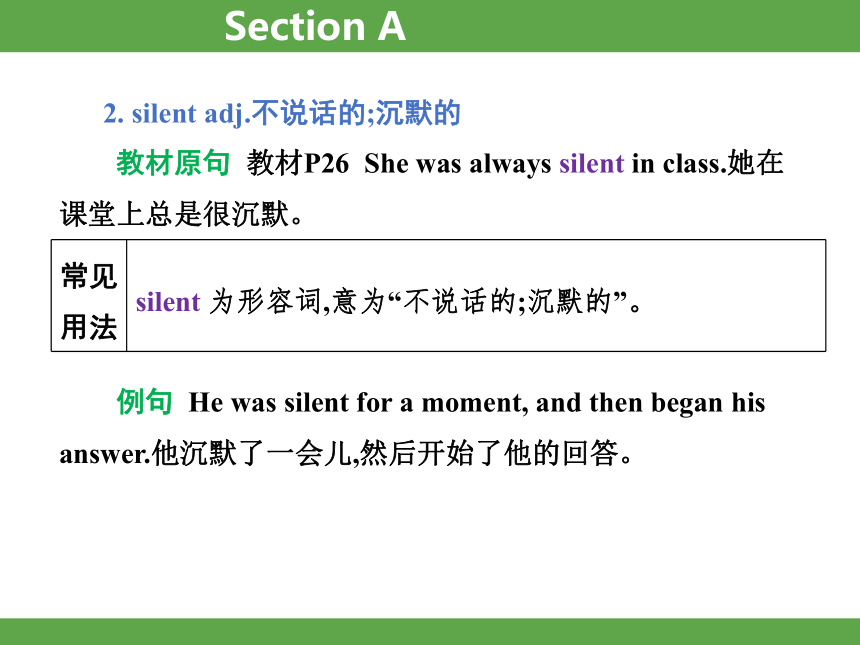
文档简介
(共63张PPT)
Unit 4 I used to be afraid of the dark.
语
言
知识目
标
单元素养目标
词汇
话题
我们是如何变化的(How we have changed)
四会词
humorous; silent; helpful; score; background; interview; Asian; deal; dare;ton; private; guard; require; European; African; British; ant; speech;public; seldom; influence; absent; fail; examination; exactly; pride; proud;general; introduction
非四会词
shyness; crowd;
insect; boarding
Unit 4 I used to be afraid of the dark.
语
言
知识目
标
单元素养目标
重点
短语
used to; from time to time; see sb. doing sth.;
take up; deal with; be able to; too much;
give up; in public; take care of; make friends;
advise sb. to do sth.; in person; take pride in;
be proud of
1. Mario, you used to be short, didn't you
2. Did Mario use to be short
3.It’s been three years since we last saw our primary school classmates.
4. Only a very small number of people make it to the top.
5. They take pride in everything good that I do.
6. I'm much happier now, and I work even harder than I used to.
重点
句型
Unit 4 I used to be afraid of the dark.
语
言
知识目
标
单元素养目标
语法
used to的用法和句式变化
语言能力目标
听:能够听懂以人物外貌和性格变化
为话题的听力材料
说:能够谈论人物的外貌和性格方面
所发生的变化
读:能够读懂以人物外貌和性格变化
为话题的阅读材料
写:能够以书面形式描述某人在外貌
和性格方面的变化
● 考点清单解读
一 单词背记及拓展
二 重点词汇
三 重点句式
Section A
Section A
一 单词背记及拓展
重点单词 词汇拓展
重 点 单 词 1. humorous adj.有幽默感的;滑稽有趣的 2. silent adj.不说话的;沉默的 3. helpful adj.有用的;有帮助的 4. score n. & v.得分;进球 5. background n.背景 1. humorous adj.→humor(名词)幽默;诙谐
2. silent adj.→silence(名词)沉默;安静;缄默
3. helpful adj. →help (动词/名词)帮助
→helper(名词)助手;帮手
Section A
重点单词 词汇拓展
重 点 单 词 6. interview v.采访;面试 n.面试;访谈 7. Asian adj.亚洲(人)的 n.亚洲人 8. dare v.敢于;胆敢 9.ton n.吨;(pl.)大量;许多 10. private adj.私人的;私密的 4. interview v. →interviewer(名词)采访者;主持面 试者
5. Asian adj.→Asia(名词)亚洲
6. dare v.→dared(过去式)敢于;胆敢→dared (过去分词)敢于;胆敢
7.ton n.→tons (复数) 吨
Section A
重点单词 词汇拓展
重 点 单 词 11. guard n.警卫;看守 v.守卫;保卫 12. require v.需要;要求 13. European adj.欧洲(人)的 n.欧洲人 14. African adj.非洲(人)的 n.非洲人 15. British adj.英国(人)的 8. private adj. →privately(副词)私下地;秘密地
9. require v.→requirement(名词)要求;必要条件;必需品
→required (过去式)需要;要求
10. European adj.→Europe(名词)欧洲
Section A
重点单词 词汇拓展
重 点 单 词 16. speech n.讲话;发言 17. public n.民众 adj.公开的;公众的 18. deal v.对付;对待 19.ant n.蚂蚁 11. African adj. →Africa (名词)非洲
12. British adj.→Britain(名词)英国;不列颠
13. speech n.→speak(动词)说话;演讲;表明
→speaker(名词)讲(某种语言)的人;发言者
Section A
重点单词 词汇拓展
重 点 单 词 14. deal v.→dealt(过去式)对付;对待
→dealt (过去分词)对付;对待
熟词生义
background 作名词,还可意为“底色;底花”。
Section A
二 重点词汇
1. helpful adj.有用的;有帮助的
例句 Our teacher gave us a lot of helpful books in English.我们老师给了我们许多在英语方面有帮助的书。
These things are helpful to my life.这些东西对我的生活是有帮助的。
常见用法 helpful 为形容词,意为“有用的;有帮助的”,在句中作表语或定语。常用搭配:be helpful to对……有益/有帮助。
Section A
拓展提升
“动词/名词+ful”构成形容词
Section A
2. silent adj.不说话的;沉默的
教材原句 教材P26 She was always silent in class.她在课堂上总是很沉默。
例句 He was silent for a moment, and then began his answer.他沉默了一会儿,然后开始了他的回答。
常见用法 silent 为形容词,意为“不说话的;沉默的”。
Section A
拓展提升
Section A
3. require v.需要;要求
教材原句 教材P27 You really require a lot of talent and hard work to succeed.你真的需要很多天赋和辛勤工作来取得成功。
常见用法 require 是及物动词,意为“需要;要求”,不用于进行时。常用于以下搭配:(1)requiresth.需要某物(2)require sb. to do sth.要求某人做某事(3)sth. require(s) doing =sth. require(s) to be done某事需要被做(4)require+that从句(从句中如含有“should+动词原形”,should可以省略)要求……
Section A
例句 They required us to help them.他们要求我们帮助他们。
拓展提升
require 的名词形式为requirement,意为“要求;必要条件;必需品”。如:The most important requirement is to speak English well.最重要的要求是英语要讲得好。
Section A
4. dare v. 敢于;胆敢
教材原句 教材P27 As she got better, she dared to sing in front of her class, and then for the whole school.随着她变得更好,她敢在全班同学面前唱歌了,然后敢为全校师生唱歌了。
常见用法 dare 用作实义动词时,意为“敢于;胆敢”,可以有时态、数的变化,其后常跟不定式,有时to也可省去(尤其是在否定句或是疑问句中),一般不用于进行时。
例句 The boy stood before the teacher, not daring (to) look up. 这个男孩站在老师面前,不敢抬头看。
Section A
拓展应用
dare 可用作情态动词,其后接动词原形,常用于否定句或疑问句中以及if或whether引导的从句中。
如:Dare you tell her the truth 你敢告诉她真相吗
I don't know whether he dare try.我不知道他是否敢试一试。
Section A
5. interview v.采访;面试n.面试;访谈
教材原句 教材P27 For this month's Young World magazine, I interviewed 19-year-old Asian pop star Candy Wang.为了这个月的《年轻世界》杂志,我采访了19岁的亚洲流行歌手王坎迪。
常见用法 interview 作名词,意为“面试;访谈”。an interview with sb.意为“对某人的访谈”。interview作动词,意为“采访;面试”。interview sb.意为“采访/面试某人”。
Section A
拓展提升
interviewee作名词,意为“被采访者;参加面试者”;interviewer作名词,意为“采访者;主持面试者”。
例句 There will be an interview with the writer this afternoon.今天下午将有一场对这名作家的采访。
Section A
6. from time to time偶尔;有时
教材原句 教材P26 She still plays the piano from time to time.她仍偶尔弹钢琴。
常见用法 from time to time 意为“偶尔;有时”,相当于at times或sometimes,在句中作时间状语。
例句 I could see Li Ming in the reading room from time to time.我有时能在阅览室看见李明。
Section A
拓展提升
含有 time的其他常用短语:
on time 准时;按时
in time 及时
at the same time同时
all the time 总是;一直
at times 有时;偶尔
by the time到……时候
Section A
7. take up 开始做deal with 处理;应对
教材原句 教材P27 Candy told me that she used to be really shy and took up singing to deal with her shyness.坎迪告诉我她曾经很害羞,于是开始唱歌来克服害羞。
常见用法 (1)take up 意为“(尤指为消遣)学着做;开始做”,还有“占用占据”的意思,可以和空间或时间搭配。
(2)deal with 是固定搭配,意为“处理;应对”。
Section A
例句 James took up Chinese one year and a half ago.
詹姆斯一年半以前开始学习汉语。
Today's meeting will deal with these problems.
今天的会议将会处理这些问题。
Section A
图解妙记
That big desk takes up too much room.
那张大桌子占的地方太多了。
It takes up too much time to play computer games.
玩电脑游戏太占用时间了。
Section A
8. in public 公开地;在别人(尤指生人)面前
教材原句 教材P28 giving a speech in public 公开演讲
常见用法 in public 是固定搭配,意为“公开地;在别人(尤指生人)面前”。
看图背例句
Jack is very nervous when he speaks in public.
杰克当众讲话时感到很紧张。
Section A
拓展提升
常见的“in+名词”结构的短语:
in surprise 惊讶地
in person 亲自
in time 及时
in trouble 处于困境中
in danger处于危险中
in fact 其实
in total 总计
in silence 沉默地
Section A
三 重点句式
1.反意疑问句
教材原句 教材P25 Mario, you used to be short, didn't you 马里奥,你以前很矮,不是吗
常见用法 本句含有反意疑问句,其特点是“前肯后否”,而且后半句的动词在时态、人称和数等方面要与前半句的动词相呼应。回答反意疑问句时,肯定回答为“Yes,主语+肯定结构.”;否定回答为“No,
主语+否定结构.”。
Section A
例句 ——You didn't like classical music, did you 你不喜欢古典音乐,对吗
——Yes, I did./ No, I didn't.不,我喜欢。/是的,我不喜欢。
Section A
易错提示
无论反意疑问句是何种形式,依据事实来回答即可。如果事实是肯定的,要用yes;如果事实是否定的,要用no。只是要注意“前否后肯”的答语中,yes 和no 与汉语意思正好相反。
Section A
2. It's been+时间段+since引导的时间状语从句
教材原句 教材P26 It's been three years since we last saw our primary school classmates.自我们上次见到小学同班同学以来已经三年了。
常见用法 本句为“It’s been+时间段+since 引导的时间状语从句”,表示“自……以来已经……”。本结构中,since引导的从句用一般过去时,主句用现在完成时。It’s是It has的缩写。
例句 It has been two years since I came to this school.自我来到这个学校以来已经两年了。
Section A
拓展提升
since 是现在完成时的标志词,还可构成如下结构:
(1)since+过去一个时间点
I have had this computer since2019.2019年我买了这台电脑。
(2)since+一段时间+ago
I have had this computer since four years ago.我从四年前就有了这台电脑。
● 考点清单解读
一 单词背记及拓展
二 重点词汇
三 重点语法
Section B
Section B
一 单词背记及拓展
重点单词 词汇拓展
重 点 单 词 1. seldom adv.不常;很少 2. influence v. &n.影响 3. absent adj.缺席;不在 4. fail v.不及格;失败;未能(做到) 5. examination n.考试;审查 6. exactly adv.确切地;精确地 1. absent adj.→absence(名词)缺乏;缺席
→present(反义词)出席的;到场的
2. fail v.→failed (过去式/过去分词)不及格;失败;未能
(做到)→failure(名词)失败;故障→succeed(反义词)成功
Section B
重点单词 词汇拓展
重 点 单 词 7. pride n.自豪;骄傲 8. proud adj.自豪的;骄傲的 9. general adj.总的;普遍的;常规的 n.将军 10. introduction n.介绍 3. examination n.→exam(近义词)考试;测验
→examine(动词)测验;考查;检查4. exactly adv.→exact(形容词)准确的;精确的
5. general adj. →generally(副词)通常;普遍地;一般地
6. introduction n.→introduce(动词)介绍;引进
Section B
二 重点词汇
1. seldom adv.不常;很少
常见用法 seldom 表示频率,通常置于助动词、情态动词和be动词之后,实义动词之前。
教材原句 教材P30 When he was a little boy, he seldom caused any problems, and his family spent a lot of time together.当他是个小男孩时,他很少惹麻烦,而且他和他的家人在一起度过了很多时光。
Section B
例句 I’ve seldom seen such a big watermelon.我很少看到这么大的西瓜。(seldom用于助动词之后)
Tom seldom goes to school by bus.汤姆很少乘坐公交车上学。(seldom用于实义动词之前)
Section B
拓展提升
(1)seldom 是表示否定含义的词,在反意疑问句中,附加问句部分应用肯定形式,类似的词还有hardly,rarely, never 等。
(2) 频度副词表示的频率大小顺序为:always >usually >often >sometimes >seldom >hardly ever>never
Section B
2. influence v. & n.影响
教材原句 教材P30 Li Wen's unhappiness began to influence his schoolwork.李文的不开心开始影响他的学业。
常见用法 influence 既可作名词,也可作动词,意为“影响”,指对行动、思想、性格等产生的不易觉察到的、潜移默化的影响。常用于以下搭配:
influence sb./ sth.影响某人/某事
be influenced by...被……影响
influence sb. to do sth.影响某人做某事
have a/ an... influence on...对……有……的影响
Section B
例句 The bad environment influenced people a lot.糟糕的环境对人们影响巨大。
His writing has influenced millions of people.他的作品影响了数百万人。
Section B
图解妙记
Section B
3. fail v.不及格;失败;未能(做到)
教材原句 教材P30 Sometimes he was absent from classes and failed his examinations.有时他旷课,并且考试不及格。
常见用法 fail 既可作及物动词,也可作不及物动词,意为“不及格;失败;未能(做到)”。
看图背例句
Jack failed in the exam; he cried sadly.
杰克考试不及格,他哭得很伤心。
Section B
拓展提升
fail 的名词形式为failure,表示“失败;故障;失败的人或事”。如:Failure is the mother of success.失败是成功之母。
The whole thing was a complete failure.整个事情彻底失败了。
Section B
4. proud adj.自豪的;骄傲的
教材原句 教材P30 I know my parents love me and they're always proud of me...我知道我的父母爱我,他们总是以我为傲…
常见用法 proud 作形容词,意为“骄傲的;自豪的”,常见用法:be proud of为……骄傲;be proud to do sth.自豪地做某事。
例句 We are proud of Chinese Volleyball Team.
我们为中国排球队骄傲。
I am very proud to be a Chinese.
身为中国人,我感到无比自豪。
Section B
拓展提升
proud 的名词形式为 pride,意为“自豪;骄傲”。常见搭配为take pride in,意为“为……感到自豪”。
如:We take pride in the great development of our nation.我们为我们国家的伟大发展而骄傲。
Section B
5. exactly adv.确切地;精确地
教材原句 教材P30 “It was exactly what I needed," he said.“这正是我需要的,”他说。
常见用法 exactly 作副词,意为“确切地;精确地”,常在句中作状语。exactly的形容词形式是exact,意为“准确的;精确的”。
例句 You made exactly the same mistakes yesterday.你们昨天犯了一模一样的错误。
Section B
拓展提升
exactly 还可用作回答语,表示赞同或强调正确,意为“一点不错,正是如此,完全正确”。not exactly 用于纠正对方刚说过的话,意为“不完全”;或说反话时用,意为“根本不”。
Section B
6. introduction n.介绍
教材原句 教材P32 General introduction about the changes in your life大致介绍一下你生活中的变化
常见用法 introduction 意为“介绍”时,为可数名词。make introductions to sb.意为“向某人作介绍”。
例句 Jack looked through the introduction about the book before he decided to buy it.杰克在决定购买该书之前浏览了介绍。
Section B
拓展提升
introduce 作动词,意为“介绍;引进;传入”。introduce... to...表示“把……介绍给……”。如:
The teacher introduced us to the visitors before the welcome party.在欢迎会之前,老师把我们介绍给了参观者。
Section B
7. advise sb. to do sth.建议某人做某事
教材原句 教材P30 She advised them to talk with their son in person.她建议他们亲自与自己的儿子谈一谈。
常见用法 advise sb. to do sth.建议某人做某事,其否定结构为advise sb.not to do sth.。其中advise是动词,意为“建议”,其他用法如下:advisedoingsth.建议做某事;“advise+that从句”表示“建议……”,从句的谓语动词用“should+动词原形”,其中should 可以省略。
Section B
例句 The policeman advised that we (should) pay attention to that building.警察建议我们注意那幢建筑物。
拓展提升
advise 的名词形式是advice ,advice 是不可数名词,意为“建议”。表示“一条建议”用a piece of advice。
如:Could you please give me a piece of advice about using WeChat 你能够给我一条使用微信的建议吗
Section B
三 重点句式
used to 的用法
教材原句 教材P28 Paula used to be really quiet.葆拉过去特别安静。
教材P28 Did he use to wear glasses 他过去戴眼镜吗
教材P28 I didn't use to be popular in school.我过去在学校不受欢迎。
教材P28 You used to be short, didn't you 你过去个子很矮,不是吗
Section B
常见用法 (1)used to的意义和用法
used to 意为“过去常常”,其后接动词原形,表示过去存在的某种状态或者过去的某种经常性、习惯性的行为或者动作,只能用在一般过去时中。
Section B
句式 结构
肯定句 主语+used to do sth.
He used to play basketball after school.他过去常常
放学后打篮球。
否定句 主语+didn't use to do sth.
She didn't use to have long hair.她过去不留长发。
(2)used to 的句式结构
Section B
否定句 主语+used not to do sth.
Betty used not to play the piano.贝蒂以前不弹钢琴。
They used not to allow shops to be open on Sundays.
他们以前不允许商店在星期天营业。
一般疑问句 Did+主语+use to do sth.
Did your sister use to be quiet 你的妹妹过去很安
静吗
Used+主语+to do sth.
Used Li Ming to go to school by bike 李明以前骑
自行车去学校吗
Section B
存现句 (there be结构) There used to be...
There used to be a lot of beautiful flowers in this
garden.这个花园里过去有很多漂亮的花。
反意疑问句 前肯后否
The man used to be a teacher,didn't he 这个男
人过去是一名老师,不是吗
前否后肯
The woman didn't use to go to work on foot, did
she 这个女人过去不步行上班,是吗
Section B
易混辨析 与 used to相关的用法辨析:
(1)used to do sth.意为“过去常常做某事”,表示过去习惯性的动作或状态,有与现在对比的含义。
如:There used to be many kinds of dinosaurs on the earth.地球上曾有很多种恐龙。
(2)be used to do sth.意为“被用来做某事”,强调用途,句中的主语应为表示物的名词或代词。
如:The shoes are used to climb the mountains.这双鞋是用来爬山的。
Section B
(3)get/ be used to doing sth.意为“习惯于做某事”,句中的主语常是表示“人”的名词或代词。
如:More and more people get/ are used to shopping on the Internet.越来越多的人习惯网购。
语篇考法精讲
写作手法题解题技巧
典例剖析
Many years ago, on my first day of middle school, one of my roommates turned to me for help. He took a bottle of water out of his bag. I opened it for him easily, and he thanked me. But I felt quite shy when he said thanks to me.
A week later, we started to receive military training(军训).We needed to gather at 6:30 a.m. every day. However, I was still in the bed at 6:00 on the first day. My roommate woke me up and I really thanked him. Luckily, neither of us was late for that day's training. Later, I had a talk with him...
语篇考法精讲
Over the next three years, we continued to help each other, but we almost never said thank you. For many years, I didn't think it was necessary to say thank you out loud...
My attitude(态度)towards saying thanks didn't change until I helped a group of kids. ... I realized the importance of expressing thanks from then on.
Showing thanks is a polite way for a conversation. It will let the other side know that you're thankful for his or her action. So next time, when you feel thankful, express your thanks bravely.
语篇考法精讲
[中考新考法·写作手法]
In which order is the text written
A. Space.
B. Time.
C. Persons.
D. Opinions.
语篇考法精讲
[解析]通读文章可知,本文通过作者的经历讲述了自己对“是否需要表达谢意”的观点的转变,是以时间顺序来写的。
[答案] B
语篇考法精讲
考法说明
中考对写作顺序题的考查角度主要包含以下几种:
1.时间顺序:常用于写人、叙事、写景等文章。
2.空间位置的变化顺序:常用于游记、活动、经历等。
3.人物顺序:常用于介绍多个人物。
4.事情的发展顺序:常用于描写事件的起因、经过、结果等。
语篇考法精讲
技巧点拨
此类题目要根据文章中出现的表示顺序、时间、地点的词,如:first,next,in2020,many years ago, at home, at school 等,来推测文章的写作顺序。
Unit 4 I used to be afraid of the dark.
语
言
知识目
标
单元素养目标
词汇
话题
我们是如何变化的(How we have changed)
四会词
humorous; silent; helpful; score; background; interview; Asian; deal; dare;ton; private; guard; require; European; African; British; ant; speech;public; seldom; influence; absent; fail; examination; exactly; pride; proud;general; introduction
非四会词
shyness; crowd;
insect; boarding
Unit 4 I used to be afraid of the dark.
语
言
知识目
标
单元素养目标
重点
短语
used to; from time to time; see sb. doing sth.;
take up; deal with; be able to; too much;
give up; in public; take care of; make friends;
advise sb. to do sth.; in person; take pride in;
be proud of
1. Mario, you used to be short, didn't you
2. Did Mario use to be short
3.It’s been three years since we last saw our primary school classmates.
4. Only a very small number of people make it to the top.
5. They take pride in everything good that I do.
6. I'm much happier now, and I work even harder than I used to.
重点
句型
Unit 4 I used to be afraid of the dark.
语
言
知识目
标
单元素养目标
语法
used to的用法和句式变化
语言能力目标
听:能够听懂以人物外貌和性格变化
为话题的听力材料
说:能够谈论人物的外貌和性格方面
所发生的变化
读:能够读懂以人物外貌和性格变化
为话题的阅读材料
写:能够以书面形式描述某人在外貌
和性格方面的变化
● 考点清单解读
一 单词背记及拓展
二 重点词汇
三 重点句式
Section A
Section A
一 单词背记及拓展
重点单词 词汇拓展
重 点 单 词 1. humorous adj.有幽默感的;滑稽有趣的 2. silent adj.不说话的;沉默的 3. helpful adj.有用的;有帮助的 4. score n. & v.得分;进球 5. background n.背景 1. humorous adj.→humor(名词)幽默;诙谐
2. silent adj.→silence(名词)沉默;安静;缄默
3. helpful adj. →help (动词/名词)帮助
→helper(名词)助手;帮手
Section A
重点单词 词汇拓展
重 点 单 词 6. interview v.采访;面试 n.面试;访谈 7. Asian adj.亚洲(人)的 n.亚洲人 8. dare v.敢于;胆敢 9.ton n.吨;(pl.)大量;许多 10. private adj.私人的;私密的 4. interview v. →interviewer(名词)采访者;主持面 试者
5. Asian adj.→Asia(名词)亚洲
6. dare v.→dared(过去式)敢于;胆敢→dared (过去分词)敢于;胆敢
7.ton n.→tons (复数) 吨
Section A
重点单词 词汇拓展
重 点 单 词 11. guard n.警卫;看守 v.守卫;保卫 12. require v.需要;要求 13. European adj.欧洲(人)的 n.欧洲人 14. African adj.非洲(人)的 n.非洲人 15. British adj.英国(人)的 8. private adj. →privately(副词)私下地;秘密地
9. require v.→requirement(名词)要求;必要条件;必需品
→required (过去式)需要;要求
10. European adj.→Europe(名词)欧洲
Section A
重点单词 词汇拓展
重 点 单 词 16. speech n.讲话;发言 17. public n.民众 adj.公开的;公众的 18. deal v.对付;对待 19.ant n.蚂蚁 11. African adj. →Africa (名词)非洲
12. British adj.→Britain(名词)英国;不列颠
13. speech n.→speak(动词)说话;演讲;表明
→speaker(名词)讲(某种语言)的人;发言者
Section A
重点单词 词汇拓展
重 点 单 词 14. deal v.→dealt(过去式)对付;对待
→dealt (过去分词)对付;对待
熟词生义
background 作名词,还可意为“底色;底花”。
Section A
二 重点词汇
1. helpful adj.有用的;有帮助的
例句 Our teacher gave us a lot of helpful books in English.我们老师给了我们许多在英语方面有帮助的书。
These things are helpful to my life.这些东西对我的生活是有帮助的。
常见用法 helpful 为形容词,意为“有用的;有帮助的”,在句中作表语或定语。常用搭配:be helpful to对……有益/有帮助。
Section A
拓展提升
“动词/名词+ful”构成形容词
Section A
2. silent adj.不说话的;沉默的
教材原句 教材P26 She was always silent in class.她在课堂上总是很沉默。
例句 He was silent for a moment, and then began his answer.他沉默了一会儿,然后开始了他的回答。
常见用法 silent 为形容词,意为“不说话的;沉默的”。
Section A
拓展提升
Section A
3. require v.需要;要求
教材原句 教材P27 You really require a lot of talent and hard work to succeed.你真的需要很多天赋和辛勤工作来取得成功。
常见用法 require 是及物动词,意为“需要;要求”,不用于进行时。常用于以下搭配:(1)requiresth.需要某物(2)require sb. to do sth.要求某人做某事(3)sth. require(s) doing =sth. require(s) to be done某事需要被做(4)require+that从句(从句中如含有“should+动词原形”,should可以省略)要求……
Section A
例句 They required us to help them.他们要求我们帮助他们。
拓展提升
require 的名词形式为requirement,意为“要求;必要条件;必需品”。如:The most important requirement is to speak English well.最重要的要求是英语要讲得好。
Section A
4. dare v. 敢于;胆敢
教材原句 教材P27 As she got better, she dared to sing in front of her class, and then for the whole school.随着她变得更好,她敢在全班同学面前唱歌了,然后敢为全校师生唱歌了。
常见用法 dare 用作实义动词时,意为“敢于;胆敢”,可以有时态、数的变化,其后常跟不定式,有时to也可省去(尤其是在否定句或是疑问句中),一般不用于进行时。
例句 The boy stood before the teacher, not daring (to) look up. 这个男孩站在老师面前,不敢抬头看。
Section A
拓展应用
dare 可用作情态动词,其后接动词原形,常用于否定句或疑问句中以及if或whether引导的从句中。
如:Dare you tell her the truth 你敢告诉她真相吗
I don't know whether he dare try.我不知道他是否敢试一试。
Section A
5. interview v.采访;面试n.面试;访谈
教材原句 教材P27 For this month's Young World magazine, I interviewed 19-year-old Asian pop star Candy Wang.为了这个月的《年轻世界》杂志,我采访了19岁的亚洲流行歌手王坎迪。
常见用法 interview 作名词,意为“面试;访谈”。an interview with sb.意为“对某人的访谈”。interview作动词,意为“采访;面试”。interview sb.意为“采访/面试某人”。
Section A
拓展提升
interviewee作名词,意为“被采访者;参加面试者”;interviewer作名词,意为“采访者;主持面试者”。
例句 There will be an interview with the writer this afternoon.今天下午将有一场对这名作家的采访。
Section A
6. from time to time偶尔;有时
教材原句 教材P26 She still plays the piano from time to time.她仍偶尔弹钢琴。
常见用法 from time to time 意为“偶尔;有时”,相当于at times或sometimes,在句中作时间状语。
例句 I could see Li Ming in the reading room from time to time.我有时能在阅览室看见李明。
Section A
拓展提升
含有 time的其他常用短语:
on time 准时;按时
in time 及时
at the same time同时
all the time 总是;一直
at times 有时;偶尔
by the time到……时候
Section A
7. take up 开始做deal with 处理;应对
教材原句 教材P27 Candy told me that she used to be really shy and took up singing to deal with her shyness.坎迪告诉我她曾经很害羞,于是开始唱歌来克服害羞。
常见用法 (1)take up 意为“(尤指为消遣)学着做;开始做”,还有“占用占据”的意思,可以和空间或时间搭配。
(2)deal with 是固定搭配,意为“处理;应对”。
Section A
例句 James took up Chinese one year and a half ago.
詹姆斯一年半以前开始学习汉语。
Today's meeting will deal with these problems.
今天的会议将会处理这些问题。
Section A
图解妙记
That big desk takes up too much room.
那张大桌子占的地方太多了。
It takes up too much time to play computer games.
玩电脑游戏太占用时间了。
Section A
8. in public 公开地;在别人(尤指生人)面前
教材原句 教材P28 giving a speech in public 公开演讲
常见用法 in public 是固定搭配,意为“公开地;在别人(尤指生人)面前”。
看图背例句
Jack is very nervous when he speaks in public.
杰克当众讲话时感到很紧张。
Section A
拓展提升
常见的“in+名词”结构的短语:
in surprise 惊讶地
in person 亲自
in time 及时
in trouble 处于困境中
in danger处于危险中
in fact 其实
in total 总计
in silence 沉默地
Section A
三 重点句式
1.反意疑问句
教材原句 教材P25 Mario, you used to be short, didn't you 马里奥,你以前很矮,不是吗
常见用法 本句含有反意疑问句,其特点是“前肯后否”,而且后半句的动词在时态、人称和数等方面要与前半句的动词相呼应。回答反意疑问句时,肯定回答为“Yes,主语+肯定结构.”;否定回答为“No,
主语+否定结构.”。
Section A
例句 ——You didn't like classical music, did you 你不喜欢古典音乐,对吗
——Yes, I did./ No, I didn't.不,我喜欢。/是的,我不喜欢。
Section A
易错提示
无论反意疑问句是何种形式,依据事实来回答即可。如果事实是肯定的,要用yes;如果事实是否定的,要用no。只是要注意“前否后肯”的答语中,yes 和no 与汉语意思正好相反。
Section A
2. It's been+时间段+since引导的时间状语从句
教材原句 教材P26 It's been three years since we last saw our primary school classmates.自我们上次见到小学同班同学以来已经三年了。
常见用法 本句为“It’s been+时间段+since 引导的时间状语从句”,表示“自……以来已经……”。本结构中,since引导的从句用一般过去时,主句用现在完成时。It’s是It has的缩写。
例句 It has been two years since I came to this school.自我来到这个学校以来已经两年了。
Section A
拓展提升
since 是现在完成时的标志词,还可构成如下结构:
(1)since+过去一个时间点
I have had this computer since2019.2019年我买了这台电脑。
(2)since+一段时间+ago
I have had this computer since four years ago.我从四年前就有了这台电脑。
● 考点清单解读
一 单词背记及拓展
二 重点词汇
三 重点语法
Section B
Section B
一 单词背记及拓展
重点单词 词汇拓展
重 点 单 词 1. seldom adv.不常;很少 2. influence v. &n.影响 3. absent adj.缺席;不在 4. fail v.不及格;失败;未能(做到) 5. examination n.考试;审查 6. exactly adv.确切地;精确地 1. absent adj.→absence(名词)缺乏;缺席
→present(反义词)出席的;到场的
2. fail v.→failed (过去式/过去分词)不及格;失败;未能
(做到)→failure(名词)失败;故障→succeed(反义词)成功
Section B
重点单词 词汇拓展
重 点 单 词 7. pride n.自豪;骄傲 8. proud adj.自豪的;骄傲的 9. general adj.总的;普遍的;常规的 n.将军 10. introduction n.介绍 3. examination n.→exam(近义词)考试;测验
→examine(动词)测验;考查;检查4. exactly adv.→exact(形容词)准确的;精确的
5. general adj. →generally(副词)通常;普遍地;一般地
6. introduction n.→introduce(动词)介绍;引进
Section B
二 重点词汇
1. seldom adv.不常;很少
常见用法 seldom 表示频率,通常置于助动词、情态动词和be动词之后,实义动词之前。
教材原句 教材P30 When he was a little boy, he seldom caused any problems, and his family spent a lot of time together.当他是个小男孩时,他很少惹麻烦,而且他和他的家人在一起度过了很多时光。
Section B
例句 I’ve seldom seen such a big watermelon.我很少看到这么大的西瓜。(seldom用于助动词之后)
Tom seldom goes to school by bus.汤姆很少乘坐公交车上学。(seldom用于实义动词之前)
Section B
拓展提升
(1)seldom 是表示否定含义的词,在反意疑问句中,附加问句部分应用肯定形式,类似的词还有hardly,rarely, never 等。
(2) 频度副词表示的频率大小顺序为:always >usually >often >sometimes >seldom >hardly ever>never
Section B
2. influence v. & n.影响
教材原句 教材P30 Li Wen's unhappiness began to influence his schoolwork.李文的不开心开始影响他的学业。
常见用法 influence 既可作名词,也可作动词,意为“影响”,指对行动、思想、性格等产生的不易觉察到的、潜移默化的影响。常用于以下搭配:
influence sb./ sth.影响某人/某事
be influenced by...被……影响
influence sb. to do sth.影响某人做某事
have a/ an... influence on...对……有……的影响
Section B
例句 The bad environment influenced people a lot.糟糕的环境对人们影响巨大。
His writing has influenced millions of people.他的作品影响了数百万人。
Section B
图解妙记
Section B
3. fail v.不及格;失败;未能(做到)
教材原句 教材P30 Sometimes he was absent from classes and failed his examinations.有时他旷课,并且考试不及格。
常见用法 fail 既可作及物动词,也可作不及物动词,意为“不及格;失败;未能(做到)”。
看图背例句
Jack failed in the exam; he cried sadly.
杰克考试不及格,他哭得很伤心。
Section B
拓展提升
fail 的名词形式为failure,表示“失败;故障;失败的人或事”。如:Failure is the mother of success.失败是成功之母。
The whole thing was a complete failure.整个事情彻底失败了。
Section B
4. proud adj.自豪的;骄傲的
教材原句 教材P30 I know my parents love me and they're always proud of me...我知道我的父母爱我,他们总是以我为傲…
常见用法 proud 作形容词,意为“骄傲的;自豪的”,常见用法:be proud of为……骄傲;be proud to do sth.自豪地做某事。
例句 We are proud of Chinese Volleyball Team.
我们为中国排球队骄傲。
I am very proud to be a Chinese.
身为中国人,我感到无比自豪。
Section B
拓展提升
proud 的名词形式为 pride,意为“自豪;骄傲”。常见搭配为take pride in,意为“为……感到自豪”。
如:We take pride in the great development of our nation.我们为我们国家的伟大发展而骄傲。
Section B
5. exactly adv.确切地;精确地
教材原句 教材P30 “It was exactly what I needed," he said.“这正是我需要的,”他说。
常见用法 exactly 作副词,意为“确切地;精确地”,常在句中作状语。exactly的形容词形式是exact,意为“准确的;精确的”。
例句 You made exactly the same mistakes yesterday.你们昨天犯了一模一样的错误。
Section B
拓展提升
exactly 还可用作回答语,表示赞同或强调正确,意为“一点不错,正是如此,完全正确”。not exactly 用于纠正对方刚说过的话,意为“不完全”;或说反话时用,意为“根本不”。
Section B
6. introduction n.介绍
教材原句 教材P32 General introduction about the changes in your life大致介绍一下你生活中的变化
常见用法 introduction 意为“介绍”时,为可数名词。make introductions to sb.意为“向某人作介绍”。
例句 Jack looked through the introduction about the book before he decided to buy it.杰克在决定购买该书之前浏览了介绍。
Section B
拓展提升
introduce 作动词,意为“介绍;引进;传入”。introduce... to...表示“把……介绍给……”。如:
The teacher introduced us to the visitors before the welcome party.在欢迎会之前,老师把我们介绍给了参观者。
Section B
7. advise sb. to do sth.建议某人做某事
教材原句 教材P30 She advised them to talk with their son in person.她建议他们亲自与自己的儿子谈一谈。
常见用法 advise sb. to do sth.建议某人做某事,其否定结构为advise sb.not to do sth.。其中advise是动词,意为“建议”,其他用法如下:advisedoingsth.建议做某事;“advise+that从句”表示“建议……”,从句的谓语动词用“should+动词原形”,其中should 可以省略。
Section B
例句 The policeman advised that we (should) pay attention to that building.警察建议我们注意那幢建筑物。
拓展提升
advise 的名词形式是advice ,advice 是不可数名词,意为“建议”。表示“一条建议”用a piece of advice。
如:Could you please give me a piece of advice about using WeChat 你能够给我一条使用微信的建议吗
Section B
三 重点句式
used to 的用法
教材原句 教材P28 Paula used to be really quiet.葆拉过去特别安静。
教材P28 Did he use to wear glasses 他过去戴眼镜吗
教材P28 I didn't use to be popular in school.我过去在学校不受欢迎。
教材P28 You used to be short, didn't you 你过去个子很矮,不是吗
Section B
常见用法 (1)used to的意义和用法
used to 意为“过去常常”,其后接动词原形,表示过去存在的某种状态或者过去的某种经常性、习惯性的行为或者动作,只能用在一般过去时中。
Section B
句式 结构
肯定句 主语+used to do sth.
He used to play basketball after school.他过去常常
放学后打篮球。
否定句 主语+didn't use to do sth.
She didn't use to have long hair.她过去不留长发。
(2)used to 的句式结构
Section B
否定句 主语+used not to do sth.
Betty used not to play the piano.贝蒂以前不弹钢琴。
They used not to allow shops to be open on Sundays.
他们以前不允许商店在星期天营业。
一般疑问句 Did+主语+use to do sth.
Did your sister use to be quiet 你的妹妹过去很安
静吗
Used+主语+to do sth.
Used Li Ming to go to school by bike 李明以前骑
自行车去学校吗
Section B
存现句 (there be结构) There used to be...
There used to be a lot of beautiful flowers in this
garden.这个花园里过去有很多漂亮的花。
反意疑问句 前肯后否
The man used to be a teacher,didn't he 这个男
人过去是一名老师,不是吗
前否后肯
The woman didn't use to go to work on foot, did
she 这个女人过去不步行上班,是吗
Section B
易混辨析 与 used to相关的用法辨析:
(1)used to do sth.意为“过去常常做某事”,表示过去习惯性的动作或状态,有与现在对比的含义。
如:There used to be many kinds of dinosaurs on the earth.地球上曾有很多种恐龙。
(2)be used to do sth.意为“被用来做某事”,强调用途,句中的主语应为表示物的名词或代词。
如:The shoes are used to climb the mountains.这双鞋是用来爬山的。
Section B
(3)get/ be used to doing sth.意为“习惯于做某事”,句中的主语常是表示“人”的名词或代词。
如:More and more people get/ are used to shopping on the Internet.越来越多的人习惯网购。
语篇考法精讲
写作手法题解题技巧
典例剖析
Many years ago, on my first day of middle school, one of my roommates turned to me for help. He took a bottle of water out of his bag. I opened it for him easily, and he thanked me. But I felt quite shy when he said thanks to me.
A week later, we started to receive military training(军训).We needed to gather at 6:30 a.m. every day. However, I was still in the bed at 6:00 on the first day. My roommate woke me up and I really thanked him. Luckily, neither of us was late for that day's training. Later, I had a talk with him...
语篇考法精讲
Over the next three years, we continued to help each other, but we almost never said thank you. For many years, I didn't think it was necessary to say thank you out loud...
My attitude(态度)towards saying thanks didn't change until I helped a group of kids. ... I realized the importance of expressing thanks from then on.
Showing thanks is a polite way for a conversation. It will let the other side know that you're thankful for his or her action. So next time, when you feel thankful, express your thanks bravely.
语篇考法精讲
[中考新考法·写作手法]
In which order is the text written
A. Space.
B. Time.
C. Persons.
D. Opinions.
语篇考法精讲
[解析]通读文章可知,本文通过作者的经历讲述了自己对“是否需要表达谢意”的观点的转变,是以时间顺序来写的。
[答案] B
语篇考法精讲
考法说明
中考对写作顺序题的考查角度主要包含以下几种:
1.时间顺序:常用于写人、叙事、写景等文章。
2.空间位置的变化顺序:常用于游记、活动、经历等。
3.人物顺序:常用于介绍多个人物。
4.事情的发展顺序:常用于描写事件的起因、经过、结果等。
语篇考法精讲
技巧点拨
此类题目要根据文章中出现的表示顺序、时间、地点的词,如:first,next,in2020,many years ago, at home, at school 等,来推测文章的写作顺序。
同课章节目录
- Unit 1 How can we become good learners.
- Section A
- Section B
- Unit 2 I think that mooncakes are delicious!
- Section A
- Section B
- Unit 3 Could you please tell me where the restroom
- Section A
- Section B
- Unit 4 I used to be afraid of the dark.
- Section A
- Section B
- Unit 5 What are the shirts made of?
- Section A
- Section B
- Review of Units 1-5
- Unit 6 When was it invented?
- Section A
- Section B
- Unit 7 Teenagers should be allowed to choose their
- Section A
- Section B
- Unit 8 It must belong to Carla.
- Section A
- Section B
- Unit 9 I like music that I can dance to.
- Section A
- Section B
- Unit 10 You're supposed to shake hands.
- Section A
- Section B
- Review of Units 6-10
- Unit 11 Sad movies make me cry.
- Section A
- Section B
- Unit 12 Life is full of the unexpected
- Section A
- Section B
- Unit 13 We're trying to save the earth!
- Section A
- Section B
- Unit 14 I remember meeting all of you in Grade 7.
- Section A
- Section B
- Review of Units 11-14
